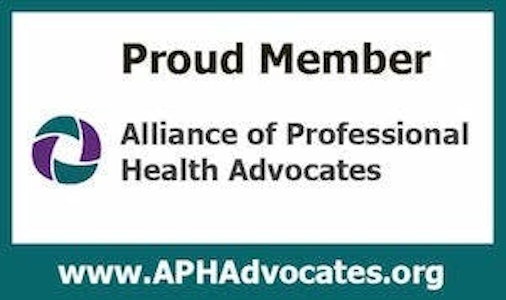
As we continue to work with clients, the biggest barrier we see is that people don’t know when they need to ask for help because they don’t know what they don’t know.
I can’t tell you how many times I’ve been asked the same question, “So, what do you do?” The answer is always something like this: “I’m an R.N. and a Patient Advocate.” And then there’s that awkward moment where they’re trying to figure out what that means. Sometimes people will get it right away and say “Oh! You’re a nurse” and just leave the rest of it alone. But more often than not, they’ll look at me with a blank stare and ask me what my job is again. It’s hard to know when someone doesn’t know enough about your industry of expertise because it happens all the time in our society – we don’t have a lot of exposure to patient advocates, unless we need one.
As an adult child of elderly parents, you may have found yourself in a difficult position. Maybe your parent has reached a point where they no longer want to live independently or their health is declining and needs more care than you can provide. You’re not sure what the next step should be or how to advocate for them.
We all know how difficult it can be to care for an aging parent. It’s a lot of work, and sometimes we don’t have the answers to our own questions about what they need or why. Why do I need an advocate? What does that entail? These are just some of the many questions that this blog post will answer. To learn more about topics regarding aging join our “keep me in the know” list for updates and when we share new material and programs.

A story was shared with us regarding a family who lived out of town from their dad. His wife had passed away in the past year. He had been living alone at their home since. The children did not know there were any issues. He never was one to cook for himself because his wife did all the cooking. He didn’t have a big appetite and was getting by. All the daughter could tell me was that one day the county nurse came to see him and she asked him what he had eaten today. He replied and said “I don’t know.” That day he was admitted to a nursing home and the family did not find out until over a week later! The family did not know what to do and how that could happen. He has passed away since we shared this conversation but the daughter stated she wished she would have had someone to help them through the process and advise them on what their resources were and how they could help their dad. They didn’t feel they had a choice to bring him to one of their home and felt because the county nurse put him in a nursing home, they could not get him out.
Some things were very clear after having this conversation
- They couldn’t have just put him in a nursing home without his consent unless it was through being chaptered and court ordered. She did not say this happened, so her dad must have agreed to be placed in a nursing home.
- Many adult children of aging parents that live away from home often feel everything is ok until something like this happens.
- The family was left with a bad taste in their mouth regarding the county nurse program and nursing homes.
What could a Nurse Advocate have done in this situation?
If we were contacted after the incident happened, our first task would be to gather all the facts of why he was admitted to the nursing home in the first place and how did he get there without any family members getting notified. This would be done after a consultation visit to determine needs, and the family’s willingness to hire us.
Next, we would begin to assess the situation and discuss with both the family and their dad what his wishes were and whether or not the family could accommodate those wishes.
Is the nursing home the right place for him? If so, is he in the nursing home of his choice? Would assisted living been an option? Would he have had the finances? Could services could have been set up in the home to make it safe?
What does the family see happening? Does a child want to bring him home to live with them? Do they have the ability to do that safely? If one child wanted to bring him home, what resources would be needed to make this a realistic and safe situation for all? This would also be part of what we do to serve the needs of the family and client.
After all the discussions and a verbal plan formulated, we would put together a written plan with what we would accomplish to make the patient centered goals readily achievable. We would work with the family to contact and initiate all the resources needed to carry out the plan successfully. We would stay with this family as long as they would continue to desire our services or after the plan was implemented, the family could choose to terminate our services.
If you have any concerns for your family or know of a family that could use some help navigating our health care system we can help! Visit our website, check out our blogs, and get on the “keep me posted” email list. You will also find some useful forms in managing cares at home.

These are some frequently asked questions.
1. What is a nurse advocate? In our case, we are R.N.s that have taken a board certification test and have to obtain continuing educations credits every 3 years to maintain our certification. We do not perform hands-on care. We are consultants. We educate, problem solve, put plans together, identify resources, and guide you through your decision-making process pertaining to your health care needs.
2. Why do I need one? You or a loved one may have several doctors and may need someone to help sort out all the information and keep all your medications current with each provider. You may have an elderly spouse and you want to keep them home but you don’t know how to go about doing that and you need guidance. Where do you start?
3. How does it work-Most advocates will have some form of consultation before services start. We offer a free consultation to determine your needs and if we can help. We present a brief summary of how we may help you reach your health care goals and then you decide if you want to hire us. We are currently privately paid at this time. There is a price range to meet everyone’s needs including monthly plans.
4. Who can be my advocate-We recommend that whomever you choose for your advocate that they are board certified and have experience in navigating the health care system. A patient advocate does not have to be an R.N. We feel this is an extra bonus for you. We have a combined total of over 80 years of nursing experience including home health, hospice, ER, acute care, quality, case management and utilization review. We have the experience to assist you in reaching your goals
5. When should I start looking for an advocate? We suggest before you are in some sort of health care crisis. The more time we have to plan and obtain the necessary resources the better the outcomes.
6. What are the costs involved and how long will they last? Here at Your Nurse Advocate Consulting, LLC our costs start from 99.00 per month to keep us active and assisting regularly or you can purchase a package to get a certain plan or review completed and then not need further assistance. You can be a client for a month or a year. We review every 90 days to see what the continued needs may be going forward. A basic package usually starts around $400.00 depending on what services are needed and how extensive the plan may be. Every person and plan is different, so there is not a cookie cutter set of prices we can quote.

Here are some reasons you may want to consider hiring an advocate
1. The health care system is complicated and confusing
2. Nurses are experts in their field but don’t always have the time to help patients navigate the system
3. Nurse advocates are trained professionals who work with your healthcare team to make sure you’re getting the best treatment possible. We work with your current doctors and your health care team.
4. Nurse advocates can answer questions about insurance, scheduling appointments, billing and more
5. They can also provide emotional support for patients and families
6. Nurse Advocate may help you manage your chronic health condition.

A nurse advocate can help you put a plan in place to care for your aging parents or spouse. They will not only answer questions about what resources may be available, but provide education as to what you may need to ask regarding the care of your parents. It’s important that everyone has someone they trust and knows how best to take care of them when it comes time. Whether this means hiring an in-home caregiver or moving them into assisted living, our team is here to support you every step of the way on ensuring they are cared for with dignity and respect.
If you are caring for aging parents, a nurse advocate can put together a plan to help care for your loved ones. A nurse advocate will answer questions and provide education as to what you may need to ask regarding the care of your parents. They will also identify and initiate resources needed so that when the time comes, there is little left up in the air about their health needs or how they should be taken care of by professionals who specialize in this type of work. Join our “Stay In Touch” list to learn more on topics related specifically to age-related issues like Alzheimer’s disease, dementia, stroke prevention etc., we would love to have you! Visit our Facebook page for recorded live videos on several topics. We are live every Wednesday evening at 7 p.m. CST.
Thank you for taking the time out of your busy schedule to spend it here with us today. We don’t take that lightly!
Talk soon,
Pam, Mary and Linda
Your Nurse Advocate Team

Your Nurse Advocates





